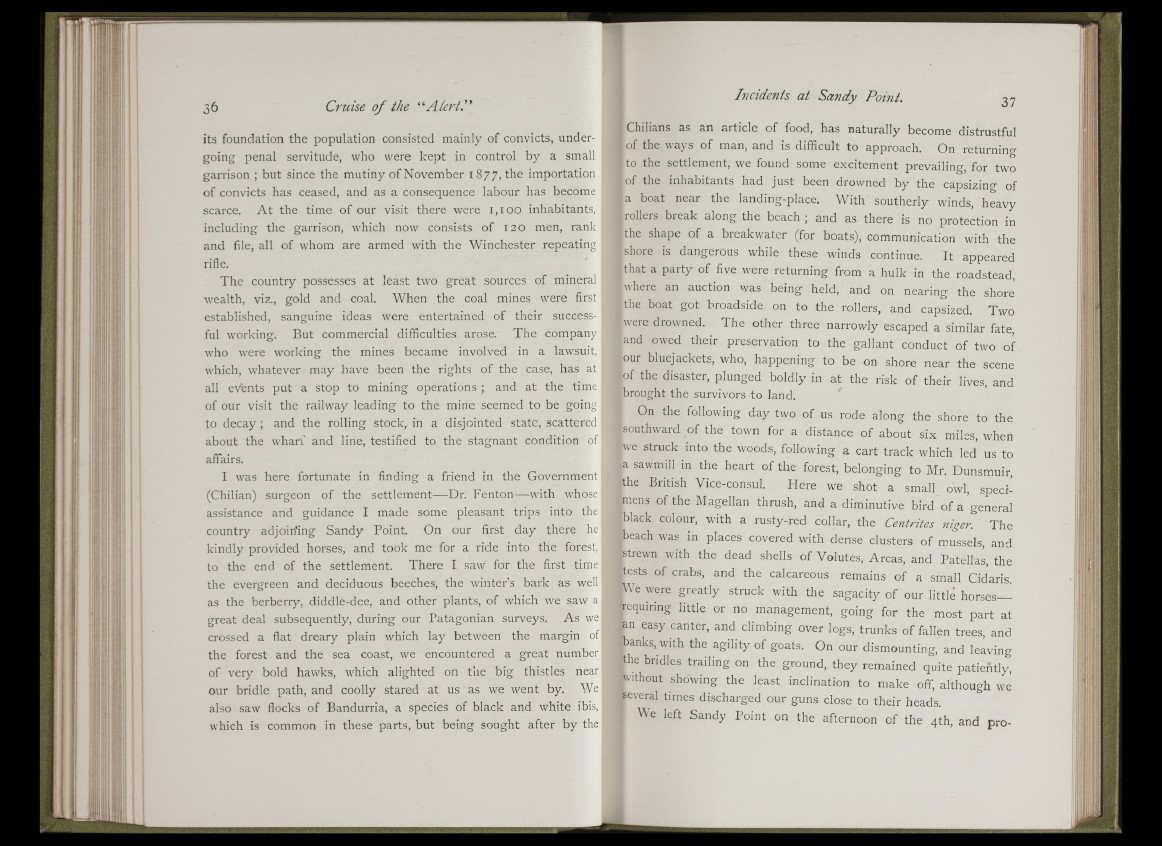
it!
I III
: .ti
I
• t>
itliuii
m i :
il.i :l1i
i' -I
! 1
! I
li
I: I
I •
its foundation the population consisted mainly of convicts, undergoing
penal servitude, who were kept in control by a small
garrison ; but since the mutiny of November 1877, the importation
of convicts has ceased, and as a consequence labour has become
scarce. At the time of our visit there were 1,100 inhabitants,
including the garrison, which now consists of 120 men, rank
and file, all of whom are armed with the Winchester repeating
rifle.
The country possesses at least two great sources of mineral
wealth, viz., gold and coal. When the coal mines were first
established, sanguine ideas were entertained of their successful
working. But commercial difficulties arose. The company
who were working the mines became involved in a lawsuit,
which, whatever may have been the rights of the case, has at
all events put a stop to mining operations ; and at the time
of our visit the railway leading to the mine seemed to be going
to decay ; and the rolling stock, in a disjointed state, scattered |
about the wharf and line, testified to the stagnant condition of
affairs.
I was here fortunate in finding a friend in the Government
(Chilian) surgeon of the settlement— Dr. Fenton— with whose
assistance and guidance I made some pleasant trips into the
country adjoiriing Sandy Point. On our first day there he
kindly provided horses, and took me for a ride into the forest,
to the end of the settlement. There I saw for the first time
the evergreen and deciduous beeches, the winter’s bark as well
as the berberry, diddle-dee, and other plants, of which we saw a
great deal subsequently, during our Patagonian surveys. As we
crossed a flat dreary plain which lay between the margin of
the forest and the sea coast, we encountered a great number
of very bold hawks, which alighted on tire big thistles near
our bridle path, and coolly stared at us as we went by. We
also saw flocks of Bandurria, a species of black and white ibis,
which is common in these parts, but being sought after by the
Chilians as an article of food, has naturally become distrustful
of the ways of man, and is difficult to approach. On returning
to the settlement, we found some excitement prevailing, for two
of the inhabitants had just been drowned by the capsizing of
a boat near the landing-place. With southerly winds, heavy
rollers break along the beach ; and as there is no protection in
the shape of a breakwater (for boats), communication with the
shore is dangerous while these winds continue. It appeared
that a party of five were returning from a hulk in the roadstead,
where an auction was being held, and on nearing the shore
the boat got broadside on to the rollers, and capsized. Two
were drowned. The other three narrowly escaped a similar fate,
and owed their preservation to the gallant conduct of two of
our bluejackets, who, happening to be on shore near the scene
of the disaster, plunged boldly in at the risk of their lives, and
brought the survivors to land.
On the following day two of us rode along the shore to the
southward of the town for a distance of about six miles, when
we struck into the woods, following a cart track which led us to
a sawmill in the heart of the forest, belonging to Mr. Dunsmuir,
the British Vice-consul. Here we shot a small owl, specimens
of the Magellan thrush, and a diminutive bird of a general
black colour, with a rusty-red collar, the Centrites niger. The
beach was in places covered with dense clusters of mussels, and
strewn with the dead shells of Volutes, Areas, and Patellas, the
tests of crabs, and the calcareous remains of a small Cidaris.
We were greatly struck with the sagacity of our little horses—
requiring little or no management, going for the most part at
an easy canter, and climbing over logs, trunks of fallen trees, and
banks, with the agility of goats. On our dismounting, and leaving
the bridles trailing on the ground, they remained quite patiently,
^vlthout showing the least inclination to make off, although we
several times discharged our guns close to their heads.
We left Sandy Point on the afternoon of the 4th, and pro-
%
iiHli